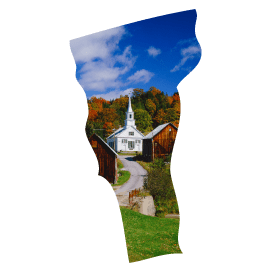Secondary Teacher Preparation in Science:
Vermont
Delivering Well Prepared Teachers Policy
Analysis of Vermont's policies
Vermont offers a secondary endorsement in general science. Candidates must achieve a passing score on the Praxis II General Science multiple choice or essay test and on one subject-specific test (either the multiple choice or essay version) of their choosing. Teachers with this license are not limited to teaching general science but rather can teach any of the topical areas.
Recommendations for Vermont
Require secondary science teachers to pass a content test for each discipline they are licensed to teach.
By allowing a general science certification—and not requiring passing scores on content tests for each subject area taught—Vermont is not ensuring that these secondary teachers possess adequate subject-specific content knowledge. Although Vermont's requirement of a passing score on a single-subject content test is a step in the right direction, it only ensures requisite subject-matter knowledge in one area. That leaves out all the other science courses that could be taught at the secondary level with a general science endorsement.
State response to our analysis
Vermont asserted that the information in the analysis is not always true. Recommendations and licenses are frequently limited to the areas of science that an applicant is qualified to teach. The state added that it does not rely completely on the Praxis to ensure meeting this goal. Vermont also uses Results Oriented Program Approval (ROPA) and transcript review.
Last word
The notion that licensing policy could be "not always true" is perplexing. The state should have clear and unequivocal policy so that teacher candidates, teacher preparation programs, school districts and the general public know what a license means.
Select another topic
Delivering Well Prepared Teachers
- Admission into Teacher Preparation
- Elementary Teacher Preparation
- Elementary Teacher Preparation in Reading Instruction
- Elementary Teacher Preparation in Mathematics
- Middle School Teacher Preparation
- Secondary Teacher Preparation
- Secondary Teacher Preparation in Science
- Special Education Teacher Preparation
- Assessing Professional Knowledge
- Student Teaching
- Teacher Preparation Program Accountability
Expanding the Pool of Teachers
Identifying Effective Teachers
- State Data Systems
- Evaluation of Effectiveness
- Frequency of Evaluations
- Tenure
- Licensure Advancement
- Equitable Distribution
Retaining Effective Teachers
Exiting Ineffective Teachers
Pensions
Research rationale
Specialized science teachers are not interchangeable.
Based on their high school science licensure requirements, many states seem to presume that it is all the same to teach anatomy, electrical currents and Newtonian physics. Most states allow teachers to obtain general science or combination licenses across multiple science disciplines, and, in most cases, these teachers need only pass a general knowledge science exam that does not ensure subject-specific content knowledge. This means that a teacher with a background in biology could be fully certified to teach advanced chemistry or physics having passed only a general science test—and perhaps answering most of the chemistry or physics questions incorrectly.
There is no doubt that districts appreciate the flexibility that these broad field licenses offer, especially given the very real shortage of teachers of many science disciplines. But the all-purpose science teacher not only masks but perpetuates the STEM crisis—and does so at the expense of students. States need either to make sure that general science teachers are indeed prepared to teach any of the subjects covered under that license or allow only single subject science certifications. In either case states need to consider strategies to improve the pipeline of science teachers, including the use of technology, distance learning and alternate routes into STEM fields.
Secondary Teacher Preparation in Science: Supporting Research
For an examination of how science teacher preparation positively impacts student achievement, see D. Goldhaber and D. Brewer, "Does Teacher Certification Matter? High School Teacher Certification Status and Student Achievement", Educational Evaluation and Policy Analysis, Volume 22, No. 2, June 20, 2000, pp. 129-145; D. Monk, "Subject area preparation of secondary mathematics and science teachers and student achievement", Economics of Education Review, Volume 13, No. 2, June 1994, pp.125-145; A. Rothman, "Teacher characteristics and student learning". Journal of Research in Science Teaching, Volume 6, No. 4, December 1969, pp. 340-348.
See also, NCTQ "The All-Purpose Science Teacher: An Analysis of Loopholes in State Requirements for High School Science Teachers." (2010).
In addition, research studies have demonstrated the positive impact of teacher content knowledge on student achievement. For example, see D. Goldhaber, "Everyone's Doing It, But What Does Teacher Testing Tell Us About Teacher Effectiveness?" Journal of Human Resources,Volume 42, No. 4, Fall 2007, pp. 765-794. See also D. Harris and T. Sass, "Teacher Training, Teacher Quality, and Student Achievement". Calder Institute,March 2007, Working Paper 3. Evidence can also be found in B. White, J. Presely, and K. DeAngelis, "Leveling Up: Narrowing the Teacher Academic Capital Gap in Illinois", Illinois Education Research Council, Policy Research Report: IERC 2008-1, 44 p.; D. Goldhaber and D. Brewer, "Why Don't Schools and Teachers Seem to Matter? Assessing the Impact of Unobservables on Educational Productivity." Journal of Human Resources, Volume 32, No. 3, Summer 1997, pp. 505-523.

